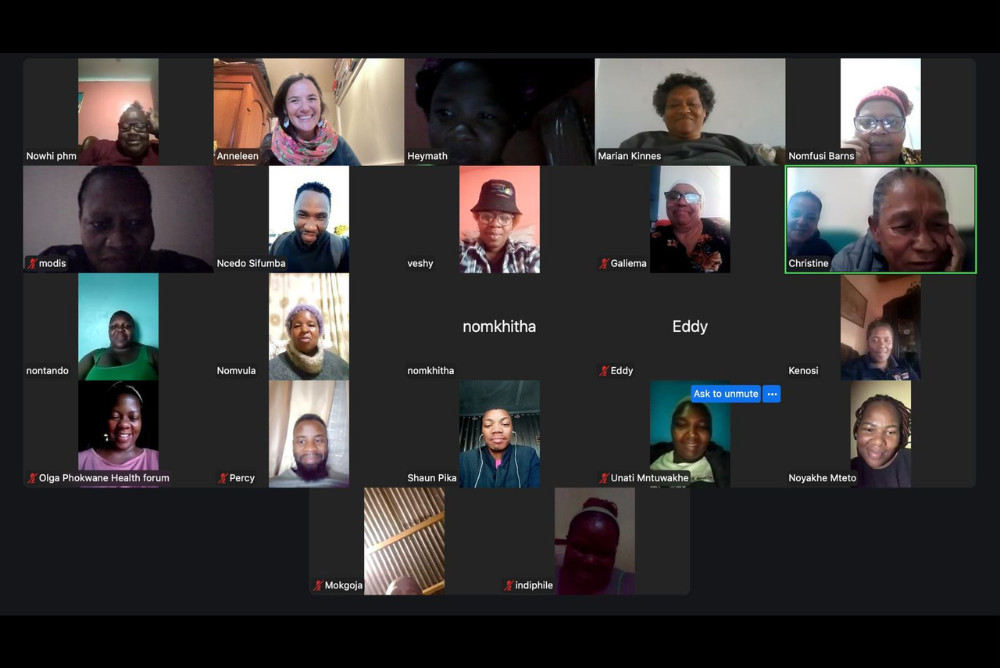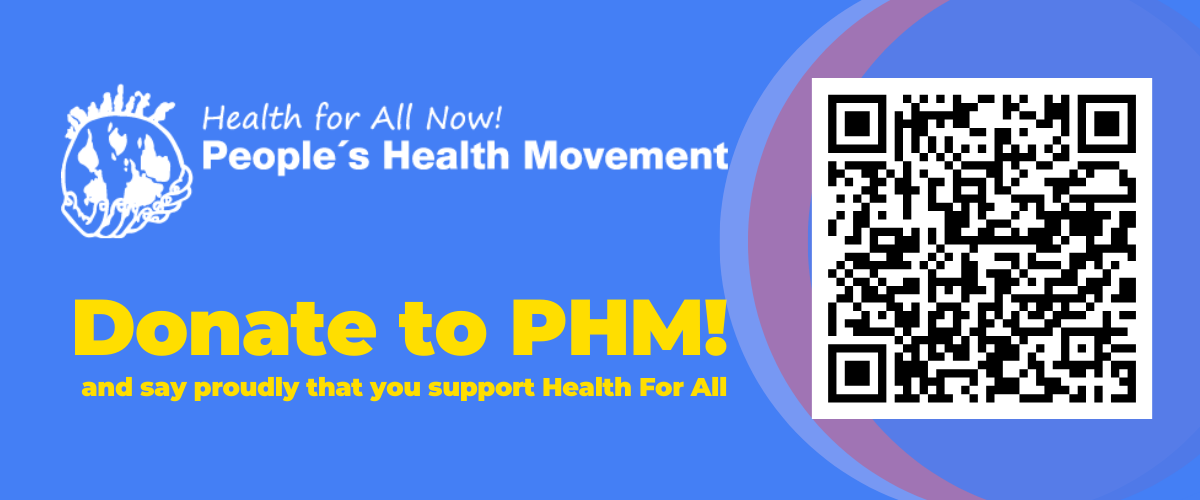PHM South Africa: Building Power from the Ground Up
Health Forums in Action: Building Power from the Ground Up
On 8th October 2025, members from different health forums came together online to share their experiences and inspire each other.
Across South Africa, community-based Health Forums are proving to be a powerful force for change in the health system. From Manenberg and Gugulethu to KSD, Phokwane, and Witzenberg, these grassroots structures are tackling everything from local clinic accountability to climate change, always with a firm commitment to equity, dignity, and justice.
In Manenberg, the Health Forum held its Annual General Meeting on the 30th of August, where the executive team was successfully re-elected. Their renewed energy is evident in their collaboration with Heideveld Hospital on a groundbreaking “Caring Communities” initiative, which offers community support to individuals with life-threatening illnesses and their families. In preparation for this work, members attended a University of Cape Town (UCT) training on grief and the emotional processes that come with loss.
The Forum is also addressing critical issues such as medication management among the elderly, who often struggle to differentiate between their medications, leading to accidental overdoses. Another area of engagement has been around climate change. Members received training on how environmental shifts are already impacting community health through increased respiratory issues and skin infections. Despite these efforts, they continue to face challenges with the City of Cape Town (COCT), particularly around the inaccessibility of community venues. The Forum is pushing for fairer policies that allow local organisations to use municipal spaces.
Manenberg Forum members are also deeply involved in a campaign to strengthen the role of clinic committees. While they support petitioning at clinics, they have highlighted the need to take this campaign directly into communities. However, the safety situation in many areas poses real risks to activists conducting door-to-door outreach. Nonetheless, the Forum remains committed to ensuring clinic committees become legitimate voices of the community, not just names on paper. Their guiding belief is that Health Forums should be the true link between communities and all health-related issues, especially those shaped by broader social conditions.
In addition, Manenberg recently hosted an inspiring “Doctor’s Day” with medical students from the U.S., aimed at motivating local children to dream big and consider futures in healthcare.
Meanwhile, in KSD (Mthatha), the Health Forum is actively addressing local barriers to health and wellbeing. Through door-to-door visits, they recently helped a learner who had no identity document access the support needed to register for and write their exams. During recent floods, when government and NGOs failed to reach certain areas, the Health Forum stepped in to identify four severely affected households. They collected and distributed food and sanitary towels, demonstrating their commitment to immediate community relief.
The Forum continues to engage local chiefs and councillors while supporting clinic operations and improving communication between facilities and the public.
In Phokwane, the Health Forum has been working with multiple stakeholders for years, although collaboration with their local councillor has proved difficult. One major issue they are trying to address is the lack of basic infrastructure. Children are forced to play near a hazardous dumping site, and residents fetch water from the same location due to poor water access. These conditions have led to serious accidents, prompting the Forum to demand action.
They have also partnered with the police station and are currently developing an LGBTQIA+ sensitivity training program in partnership with a Kimberley-based NGO. Environmental health initiatives, contraception education in clinics, and addressing unsafe conditions at the local taxi rank—which has become a drug hotspot—are all on their agenda. With children increasingly exposed to dangerous environments, the Forum has called a meeting with the mayor to demand urgent intervention.
Phokwane’s Forum is also engaging in the implementation of the National Health Insurance (NHI) system. After introducing themselves to one of the hospitals now operating under the NHI framework, they met with the area health manager and pushed for greater public participation in the rollout process. They also recently helped a teenage boy receive a new wheelchair after outgrowing the one issued to him at age six. With clinic committees largely inactive in their region, the Forum is calling to represent the community directly in quarterly health meetings.
Over in Gugulethu, the Health Forum continues to gain visibility and recognition for its work. During the first week of August, the Forum held a capacity-building event focused on unpacking the NHI. It became clear that more in-depth engagement is needed, and the Forum plans to reconvene stakeholders to strategize how to push the Department of Health for greater public participation in decision-making.
A climate change workshop was also held on 22 September in partnership with a health and wellbeing organisation. While the workshop, which was similar to the one attended by Manenberg Forum, was informative, members felt it only scratched the surface. They are determined to go deeper into understanding the links between environmental degradation and public health.
On 18 September, the Gugulethu Health Forum received a major nod of recognition when it was the only community structure invited to the Gugulethu Thumb Unveiling event, which was attended by political leaders and stakeholders. Outreach work continues as well. The Forum recently visited a local school and engaged learners from Grade R to Grade 9, while also collecting petition signatures from teachers as part of their ongoing clinic committee campaign.
Still, many health challenges remain. Community members often default on TB treatment out of fear they’ll lose their disability grants if they recover. In some cases, people refuse to give sputum samples to Community Health Workers (CHWs) because other organisations pay for the same samples. Alarmingly, CHWs have also been facing extortion, forcing the closure of some programs for their own safety.
Finally, in Witzenberg, the Health Forum is undergoing a revival. As former members became inactive, a new group has stepped in to take leadership. In one of their first actions, they visited the local clinic and discovered that community members were being turned away due to severe staff shortages. With only one nurse serving the entire community, the Forum is seeking urgent support. They are also preparing a Mental Health Awareness Day, which will bring together local stakeholders to promote wellness and reduce stigma.
A Growing Movement for Health Justice
What these forums collectively demonstrate is that health cannot be separated from the broader context in which people live. From unsafe environments and medication management to climate change, identity documents, and policy advocacy, Health Forums are addressing the real and complex challenges facing their communities. They are not only watchdogs for service delivery, but also visionary organisers, community educators, and first responders.
Despite safety concerns, resource limitations, and institutional barriers, Health Forums continue to mobilise, educate, and empower. They are pushing for genuine participation in health systems, not just symbolic consultation.



